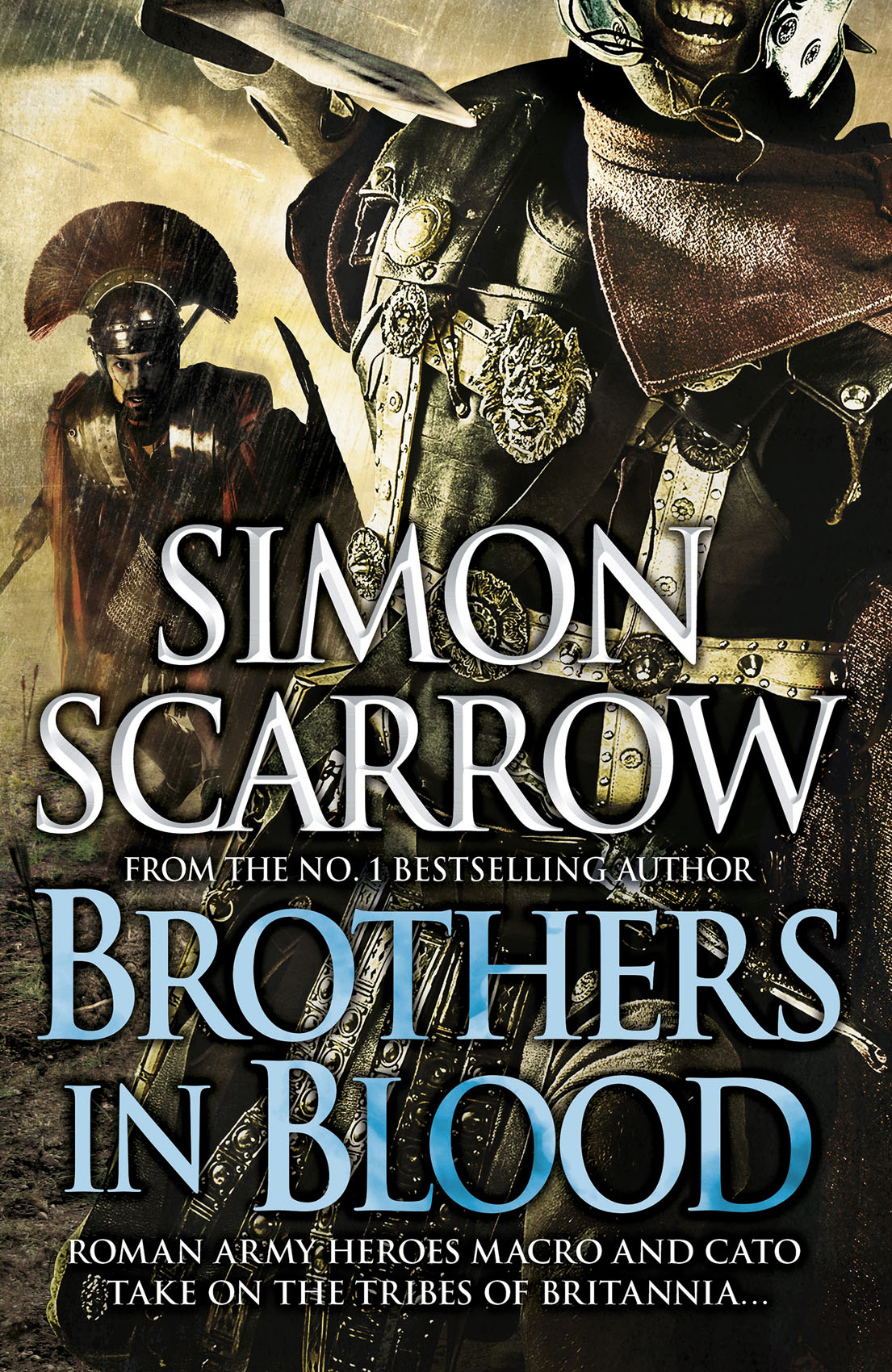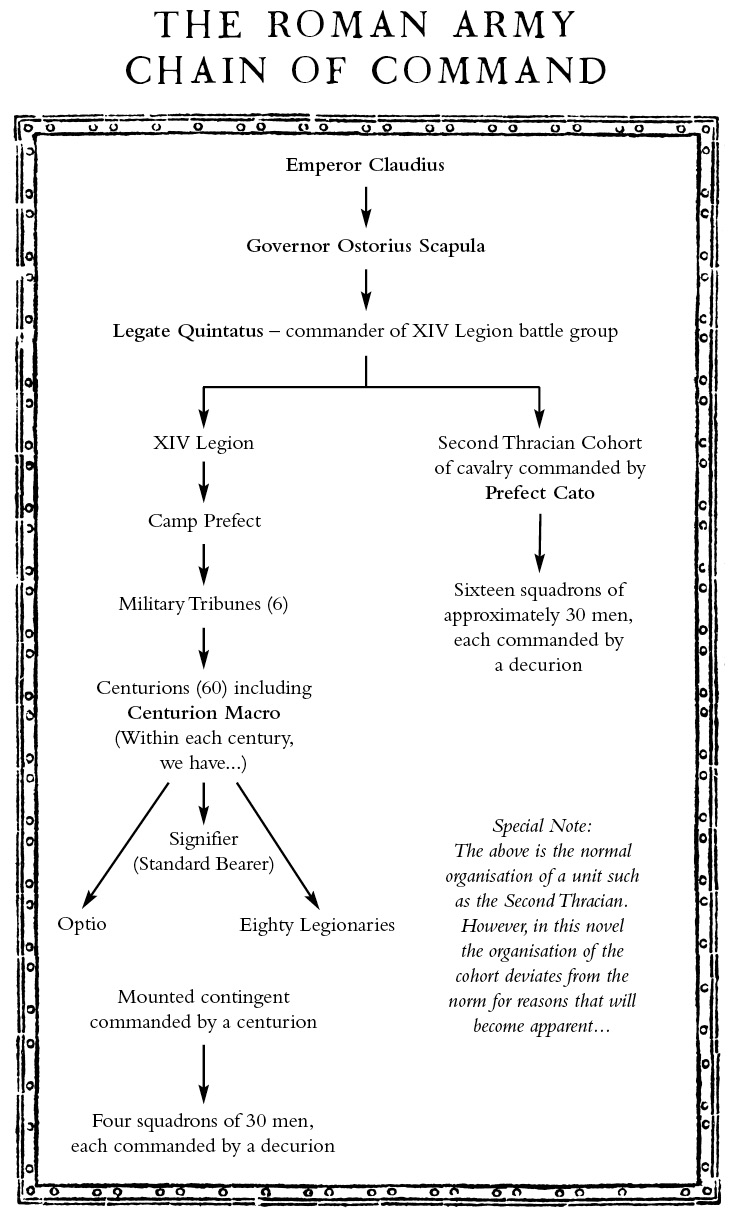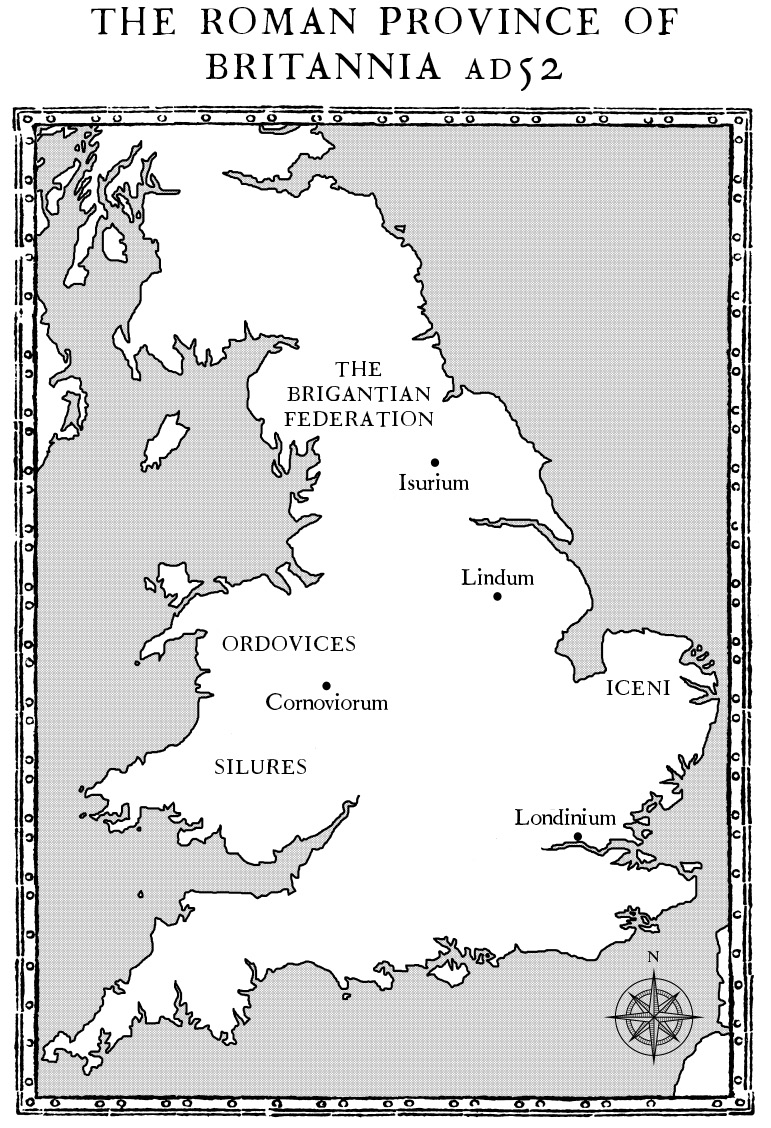Brothers in Blood
Authors: Simon Scarrow



Copyright © 2014 Simon Scarrow
The right of Simon Scarrow to be identified as the Author of the Work has been asserted by him in accordance with the Copyright, Designs and Patents Act 1988.
Apart from any use permitted under UK copyright law, this publication may only be reproduced, stored, or transmitted, in any form, or by any means, with prior permission in writing of the publishers or, in the case of reprographic production, in accordance with the terms of licences issued by the Copyright Licensing Agency.
First published as an Ebook by Headline Publishing Group in 2014
All characters – other than the obvious historical figures – in this publication are fictitious and any resemblance to real persons, living or dead, is purely coincidental.
Cataloguing in Publication Data is available from the British Library
Ebook conversion by Avon DataSet Ltd, Bidford-on-Avon, Warwickshire
Author photograph © Crest Photography
Cover design by Nik Keevil
Cover images © CollaborationJS/Arcangel Images (Centurion) and Nik Keevil
eISBN: 978 0 7553 9395 4
HEADLINE PUBLISHING GROUP
An Hachette UK Company
338 Euston Road
London NW1 3BH
ABOUT THE BOOK
Rome, AD 52. In a dark, dank cellar, a man lies in chains, fearful for his life. He carries word of a secret that endangers the lives of thousands at the farthest reaches of the Empire. Will he withstand the brutal torture that awaits him?
Britannia. The Roman troops are poised for a frontal assault on a tribal enemy whose unceasing attacks cost supplies, lives and morale. Always close to the action, the finest soldiers of the legion, Prefect Cato and Centurion Macro, lead their men into the fray with little regard for their own safety. The unexpected outcome enrages their commander – and suggests that treachery is afoot. With Rome's allies struggling to control their rebellious subjects, insurrection threatens.
If there is a spy in the army’s midst, the invasion of the barbaric but strategically vital island may be halted in its tracks. It’s imperative that Macro and Cato eliminate the threat. But can they do so in time?
ABOUT SIMON SCARROW
Simon Scarrow’s passion for writing began at an early age. After a childhood spent travelling the world he pursued his great love of history as a teacher, before becoming a full-time writer in 2005. His Roman soldier heroes Cato and Macro first stormed the book shops in 2000 in UNDER THE EAGLE, and have subsequently appeared in a number of other bestsellers including CENTURION, THE GLADIATOR and THE BLOOD CROWS.
Simon Scarrow has also written the novel ARENA, with Tim Andrews, and a series of novels about the Duke of Wellington and Napoleon Bonaparte. In addition, he writes a young adult Roman series and develops projects for television and film with his brother Alex.
To find out more about Simon Scarrow and his novels, visit
www.scarrow.co.uk
and
www.catoandmacro.com
.
By Simon Scarrow
The
Roman
Series
Under the Eagle
The Eagle’s Conquest
When the Eagle Hunts
The Eagle and the Wolves
The Eagle’s Prey
The Eagle’s Prophecy
The Eagle in the Sand
Centurion
The Gladiator
The Legion
Praetorian
The Blood Crows
Brothers in Blood
The
Wellington and Napoleon
Quartet
Young Bloods
The Generals
Fire and Sword
The Fields of Death
Sword and Scimitar
Arena
The
Gladiator
Series
Gladiator: Fight for Freedom
Gladiator: Street Fighter
Gladiator: Son of Spartacus
PRAISE FOR
SIMON SCARROW
‘I really don’t need this kind of competition . . . It’s a great read’ Bernard Cornwell
‘Rollicking good fun’
Mail on Sunday
‘Scarrow’s [novels] rank with the best’
Independent
‘[Simon Scarrow] blends together the historical facts and characters to create a book that simply cannot be put down . . . Highly recommended’
Historical Novels Review
‘A satisfyingly bloodthirsty, bawdy romp . . . perfect for Bernard Cornwell addicts who will relish its historical detail and fast-paced action. Storming stuff!’
Good Book Guide
‘A fast-moving and exceptionally well-paced historical thriller’
BBC History Magazine
For my son Joseph,
who has become a man.


CHAPTER ONE
Rome, February
AD
52
T
he streets of the capital were filled with people enjoying the unseasonal warm sunshine. It was shortly after midday and the sun shone from a clear sky. Musa sensed that he was being followed even before he first caught sight of his pursuer. That was the instinct that had first drawn the attention of his master: the innate ability to sniff out danger. A priceless quality in his line of work. The small fortune that had been spent on training him since he had been plucked from the streets off the Aventine had honed his quick wits and swift reflexes.
He was as skilled as any agent working out of the imperial palace. He knew how to stalk and kill in silence. How to disfigure and dispose of a body so that there would be very little danger of any of his victims being found, let alone identified. He knew how to code and decode messages, which poisons worked most effectively and left no telltale traces. Musa knew how to tail a man through crowds and down almost deserted alleys without ever giving away his presence.
He had also been taught to spot when he in turn was being stalked. A moment earlier when he had stopped at a baker’s stall on the edge of the Forum, appearing to all about him as just another customer eyeing up the arrangements of small loaves and pastries covering the stall, he had picked out the man: thin, dark-haired, in a plain brown tunic, who had also stopped, at a fruit stall fifteen paces back, and casually picked up a pear to scrutinise.
Musa kept him in view out of the corner of his eye, taking in every detail of his carefully anonymous appearance. After a moment he recalled seeing him in the street outside the house he had been sent to by his master earlier that morning, to convey a message. One that was too important to commit to paper, and that he had been required to memorise before setting out. His tail had been part of a group of men huddled round a dice game and he had stood up, stretched and sauntered down the street in the same direction as Musa, threading himself through the crowd. It was a detail he had observed and discounted at the time. But not any more. It was too much of a coincidence.
He smiled grimly to himself. Well then, the game was on. There were plenty of tricks he knew to lose the man. If he was any good he would see through most of them quickly enough. But Musa possessed one advantage that would give him the edge in the coming battle of wits: he had been born in these streets, had grown up in the gutter and spent most of his youth as a ragged orphan running with the street gangs. He knew every twist and turn of the streets and alleys of the vast city that sprawled across the seven hills crowding upon the fast currents of the River Tiber.
From the dark features of the man in the brown tunic Musa guessed that he was not a native of the city, but from somewhere in the eastern empire, or beyond. He could not hope to follow Musa through the maze of dark, stinking alleys of the Subura, the slum that stretched out beyond the Forum. He would lose his tail in there, and the gods help the man if he got lost while trying to follow his prey. The inhabitants of the Subura were a close-knit bunch and could smell an outsider a mile off, if only because they did not stink as much. He would be easy pickings for the first gang that decided to fall on him.
A flicker of pity crossed Musa’s mind, and he banished it at once. There was no room for sentiment in this game. The other man’s master was doubtless as ruthless as his own and he would just as willingly cut Musa’s throat for no better reason than he had been ordered to. Musa’s hand slipped down to his belt and his fingertips gently caressed the slight bulge of the knife concealed beneath the broad band of leather. He felt reassured and abruptly turned away from the baker’s stall and made off at a swift pace towards the arch leading out of the Forum. He did not have to glance back to know that the man was following him. He had turned to look the moment Musa began to move.
As he pressed through the crowd, drawing sharp comments and vicious looks from some of those he brushed past, Musa felt his heart begin to beat more quickly. A queer mixture of excitement, fear and exhilaration filled his stomach. He passed under the arch, its curved ceiling echoing back the shuffle of sandals and brief exchanges of those beneath more distinctly than the hubbub of the city on either side. He turned to his left and trotted across to the opening of an alley leading towards the Subura. A short distance ahead of him a boy in a grubby tunic and a worn pair of sandals tied together with rags was squatting against a grimy wall festooned with crude graffiti, watching those passing by. A thief, Musa decided. He knew the type well enough and he reached into his purse for a bronze coin.
‘Lad, there’s a man in a brown tunic following me. If he comes this way tell him I took a different route, that alley over there.’ Musa pointed across towards a steep lane heading in a different direction. He flipped the coin towards the boy who snatched it out of the air and nodded. Then Musa ducked into the alley leading towards the Subura. The gloomy thoroughfare was narrow and rubbish lay in small heaps along each side. There were far fewer people here and he broke into a run, keen to put as much distance between himself and his pursuer as soon as possible.
With luck he would have lost him at the arch. If his opponent was any good then he would suspect that Musa would try and escape him in the winding alleys of the Subura, and might well question the boy who had been watching those passing by. He might believe the lad’s lie, and even if he didn’t the moment’s hesitation would delay his pursuit long enough for the trail to grow cold by the time he reached the slum district. Musa ran on for several hundred paces, turning to the right and left as he entered the crumbling tenement blocks that stretched high above, almost seeming intent on crushing the narrow sliver of sky that ran unevenly above the dark alleyways. Then he slowed to a walk and breathed deeply, wrinkling his nose in disgust at the foul odour of rotting food, shit, piss and sweat that he had once taken for granted.
Musa wondered how he could ever have stomached the squalor amid which he had grown up. Since then he had become used to the scented worlds of the rich and powerful, even if he only lived on its periphery, working in the shadows. Still, he remembered these narrow streets and alleys well enough to know exactly where he was and how he could work his way round the slum before resuming his way to the house on the Quirinal hill where his master was waiting for him. Here, in the Subura, there were other dangers to be aware of and Musa proceeded cautiously, watching each man, or group of men, who approached him along a street, weighing up any threat they might pose to him. But aside from a few hostile glances, they left him alone and he eventually reached the small square in the heart of the Subura where a large fountain supplied the locals with water from a spur leading off the Julian aqueduct.
As usual the square was crowded with women and children burdened with heavy jars sent to collect water for their families. Many had stopped to gossip. Among them were small groups of youths and men, sharing wineskins as they talked or played dice. Musa was wearing a plain black tunic and, aside from the neat trim of his hair and beard, did not stand out from the rest. He felt some of the tension ease from his body and approached the fountain. He leaned over the edge of the stonework and cupped his hands in the water and drank enough to slake the thirst he had worked up eluding his pursuer. Then he splashed some water over his face and stood up and stretched his shoulders with a sense of satisfaction that his skills had served him well again.
He turned away from the fountain, and froze.
The man in the brown tunic was standing no more than fifty feet away, beyond the press of people around the fountain. He was no longer attempting to blend in, but met Musa’s gaze directly and smiled. The expression on the man’s face chilled Musa’s blood even as questions raced through his mind. How was this possible? How had the man kept up with him? How did he know where to find him? Perhaps he was a native of the city after all. Musa cursed himself for underestimating his opponent so completely.
Once again his hand slipped to his belt as he sought the reassurance of his blade now that the stakes had risen. This was no longer a matter of eluding the man. Now there was likely to be a confrontation, a far more dangerous prospect. Musa knew there was a lane that led from the square directly towards the street that climbed the Quirinal hill and he began to edge towards it, steeling himself for a sudden sprint. If he had not enough guile to escape his pursuer, then he would simply have to outrun him.
The man kept level with him as he worked his way out of the crowd and then, as Musa’s intentions became obvious, he smiled again and wagged a finger at him. For the first time Musa felt a feeling of dread, a chill that knotted itself into the back of his neck. The man nodded towards the lane and Musa glanced across the square and saw two burly figures emerge from the shadows and block his way.
‘Fuck . . .’ he muttered to himself. Three of them. Perhaps more. He could not fight his way out of the trap. Everything depended on his speed now. He moved back into the crowd where he hoped he would be safer for a moment and glanced round the square. There were four other routes open to him. He chose an alley opposite the two men and furthest from the first man. He recalled that it ran parallel to the road leading to the Quirinal. If he followed it far enough he could cut up towards the safety of his master’s house. Musa steeled himself and took a deep breath before he burst into a run, thrusting people out of his way. The air behind him filled with the angry curses of those he had knocked aside but he paid them no heed. He emerged from the crowd and dashed across the grimy flagstones towards the opening to the alley. He heard another shout above the din behind.
‘Go! Get after him!’
Musa reached the entrance to the alley and plunged into the gloom. For a moment the contrast with the brighter light of the square made it difficult to see the way, but he ran on regardless, hoping that he would not trip, or blunder into someone, or his boots lose their grip on the filth-encrusted paving stones. Then his eyes began to adjust and he picked out the details ahead of him. The small arched doorways, the entrances to tiny businesses struggling to survive on what profits were left to them after the gangs of the Subura had taken their dues. A handful of raddled women and men draped in rags held out their hands and mumbled requests for food or money and he dodged round them as the sound of his pursuers chased him along the alley. Musa gritted his teeth and urged his legs on with a growing sense of desperation.
Fifty paces ahead a shaft of light penetrated the gloom as the sun shone down the wider street that led towards the Quirinal and Musa felt a flicker of hope in his heart. If he could stay ahead of the men for another quarter of a mile he would reach safety. The junction neared and he welcomed the bright glow of the sunlight piercing the dark world of the slum. He was only ten paces from the corner when he felt a sharp blow to his shin and then he was hurtling through the air. He threw his hands out and landed heavily in the narrow channel running down the centre of the alley where foul puddles of waste lay. The impact drove the air from his lungs and for an instant Musa lay gasping for breath as his ribs burned with pain. He knew he must move and forced himself on to his knees. The thud of boots filled the air and he reached for his knife as he struggled to stand, straining to breathe. The blade came out and he began to turn, determined to strike at his enemy.
Instead a boot lashed out, smashing into his hand, and the knife dropped from his numbed fingers. Another boot struck him in the side, knocking him over and driving what little air was left in his lungs out with an agonising grunt. Musa lay doubled up, mouth open, straining to breathe as he looked up. There was the man in the brown tunic, with one of his thugs on each flank in a half crouch, fists bunched. Musa could not see what had caused him to fall and the look of pained confusion on his face made the man smile.
‘Too bad, Musa, me old cock. You put on a decent effort. But it’s over now, nay?’ He looked up, over Musa’s shoulder and grinned. ‘Good work, Petulus. Out you come, lad.’
A shadow separated from a doorway to the side of the street and moved into the light and Musa saw a small ragged urchin clutching a length of wood. He recognised him at once. The boy he had tipped a coin to misdirect his pursuer. He had been part of the pursuit all along. Not only that, but Musa now realised that he had been steered into this precise alley where the boy had lain in wait. It was a well-worked trap. As good as anything he could have arranged. Better even. He shook his head and rolled on to his back.
‘Get him up, boys.’
Rough hands grasped Musa’s limbs and hauled him on to his feet. A hand reached out and lifted his chin sharply. He saw the man in the brown tunic standing squarely in front of him. ‘Someone wants a little word with you, Musa.’
Musa stared back, teeth gritted. Then, without warning, he spat in the man’s face. ‘Fuck you,’ he gasped. ‘And fuck that Greek piece of shit you work for!’
A glint of anger flared in the man’s face before he smiled coldly. ‘The same piece of shit your master is carved from, my friend.’
Then he nodded and a dark piece of sacking dropped over Musa’s head. He smelled olives briefly before there was a dazzling white explosion of light and sharp pain and then everything went dark.